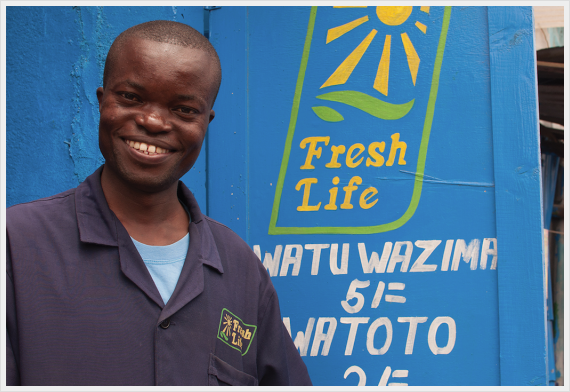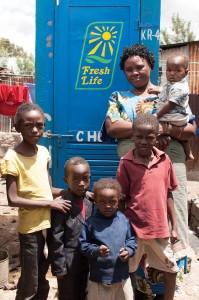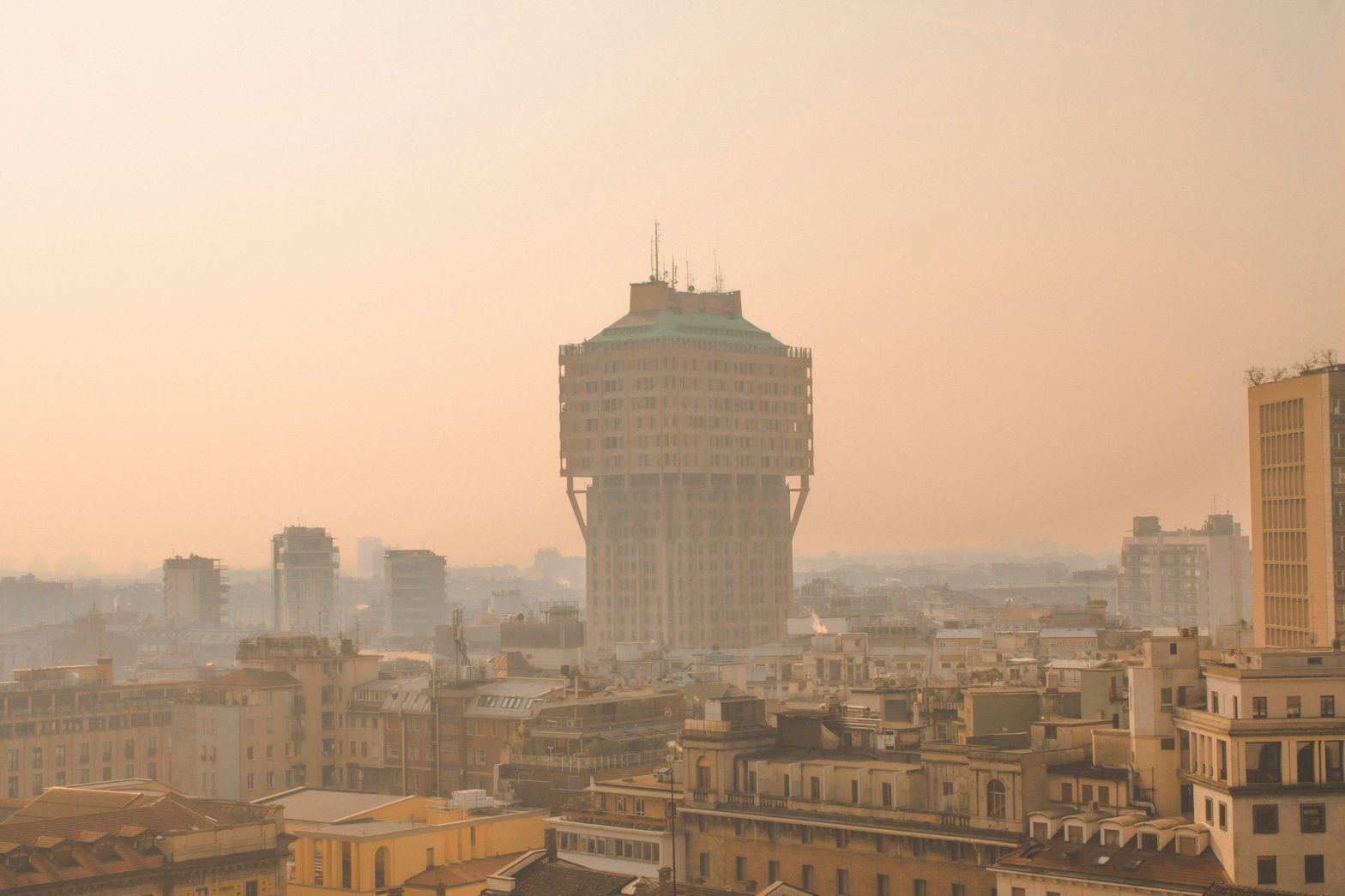
Photo: Sanergy
A new sanitation scheme for Nairobi’s slums
09 April 2014
by Richard Forster
In December last year, non-profit start-up Sanergy won the top award at the FT/Citi Ingenuity Awards for its sanitation scheme operating in the slums of Nairobi, Kenya. As Kirsty Tuxford reveals, the scheme is not only providing jobs and improved sanitation for residents in Nairobi, but it has the capacity to be extended globally to other cities.
Agnes Kwamboka lives in a slum in Nairobi, Kenya. She’s widowed with eight children. In order to earn money to support her family, she sold chang’aa, an illicit alcoholic liquor, for 16 years. The consequences of this work were severe for Agnes–she had to deal with drunk and dangerous people, she feared being raped because customers would come to her house and assume she was a prostitute, and she had to pay daily bribes to the police so they would allow her to continue selling the illegal brew. Her children stole to help supplement her meagre income and the family’s life was constantly stressful.
But her fortunes have changed. A simple idea to allow residents in informal settlements to operate sanitation facilities has brought hope to Agnes and potentially thousands of other slum dwellers worldwide.
Agnes is now a proud operator for Fresh Life Toilets, an idea devised by the non-profit organisation Sanergy to make waste disposal a profitable business for the residents of Kenya’s slums. Fresh Life Toilets are purchased and operated by slum residents who make a business out of manning and cleaning their own set of toilets. Not only does the installation of a toilet provide a legal job for Agnes but it also provides decent sanitary facilities for the whole community and employment for people trained to collect the waste. Additional benefits are that the waste is converted into organic fertiliser, which is sold at very competitive prices to local farmers and, in the future, it will also be converted into electricity.
Since Agnes became a Fresh Life Toilet owner, she has peace of mind and no longer worries about the threatening visitors she used to receive at her house. “Since I put up a Fresh Life Toilet, I am happy and my children are happy,” she says. “The Fresh Life Toilet is helping me and the money I make is not going to bribes, it’s just for me and my family. I keep all my profits and I’m able to provide for my family and also pay off my debts.”
How it works
The toilets are pretty simple: the waste falls into a container and is collected on a daily basis by local people employed by Sanergy. They use wheelbarrows as well as vehicles to remove waste as many paths and roads are unpaved in the informal settlements. There’s no need for connection to a water supply as sawdust is used in the tub where the waste falls, which stifles the odour and keeps flies away.

“We designed the toilet and waste collection system with simplicity in mind,” says David Auerbach, Co-Founder of Sanergy. “We wanted the facility to be simple to pre-fabricate, install and maintain. We also needed to think about the conditions of the informal settlements–water is relatively expensive and there is almost no sewerage. Therefore, we conceived a waterless toilet with two 30-litre cartridges underneath that capture the waste safely.”
The toilets are designed for about 100 uses per day. The operators have to purchase water for people to wash their hands. “It costs about three shillings [US$0.04] for 20 litres; that’s plenty for 50 people,” explains Auerbach. “And because the Fresh Life toilets are clean, safe and offer privacy, residents are willing to pay the five shilling fee to use them–and that’s how the operators and other Sanergy employees (90 percent of whom are locals from the informal settlement) earn a living.”
Sanergy has employed 350 people so far including the operators, the teams involved in making and installing the toilets, and the people employed at the waste conversion plants. “We have 135 staff, 161 operators, and the operators have hired an additional 70 people as Fresh Life attendants,” says Auerbach. There are 308 Fresh Life Toilets in operation with over 5 tonnes of waste collected per day.
To give an idea of how Fresh Life Toilets are improving access to adequate sanitation, consider that residents of the informal settlement Mukuru in east Nairobi pay to use unhygienic shacks that give privacy but funnel untreated waste directly into a river. When these toilets are closed, people use ‘flying toilets’ whereby people defecate into plastic bags and later throw them away in public areas. With Sanergy’s solution, people can use a clean toilet, which not only ensures that all the waste is safely removed from the area but also helps protect peoples’ dignity and offers a bona fide way to earn a living.
The toilets have also reduced the risk of sexual attacks on women. According to a study by Amnesty International, women in Africa do not want to walk more than 100 metres to go to a toilet at night because the risk of sexual assault and rape is too high. A lavatory in the neighbourhood mitigates this risk.
Award-winning idea
With the power to change lives, it’s little wonder that Sanergy’s scheme was awarded the global prize at the FT/Citi Ingenuity Awards in New York in December. The prize recognises organisations with groundbreaking solutions to meet the changing needs of their citizens, and brings global and local recognition for Sanergy, further boosting the morale of those who have worked hard to bring the idea to fruition, and also potentially attracting international interest. “This is incredible recognition of our work by some very impressive and great people and organisations,” says Auerbach. “This award brings publicity to us and so we will be able to recruit more people to join our teams.”
Sanergy addresses the entire sanitation value chain. “Our goal is to develop a highly replicable model that works in informal settlements around the world,” explains Auerbach. “When working in slums though, the scarcity of land and nebulous property rights make it really challenging to expand rapidly. We strive to find ways to work with local governments and local communities to ensure we scale successfully.”
So far the toilets are catching on thanks to a successful marketing strategy that makes people want to use Fresh Life and the education of residents is important. Paramount though is making the purchase of a Fresh Life Toilet an affordable option. The costs are 45,000 Kenyan shillings (US$525) for one toilet or 70,000 Kenyan shillings for two.
“The sale of the Fresh Life Toilet covers most of the marginal operating cost to provide hygienic sanitation services,” says Auerbach. “We’re working on exciting new revenue-generating activities, such as advertising in the toilets and selling other products such as water filters. As we grow, the sale of the fertiliser will not only cover costs, but should enable us to expand rapidly.”
Sanergy are working with several partners to help micro-entrepreneurs gain access to capital. “Kiva, the online micro-lending platform, has launched a 0 percent interest loan package for our micro-entrepreneurs and the result is that since the launch of our programme, over 50 percent of our entrepreneurs have taken up that option,” adds Auerbach.
Sanergy’s fertiliser is currently being distributed to 10 Kenyan farms and with extremely positive results. One partner, Komaza, cited a 20 to 30 percent increase in yield in their sorghum crops. Meanwhile, biogas production is still at the pilot stage–you need quite a lot of waste to start generating energy. Once Sanergy has about 1,000 toilets, they will have the capacity to produce between 0.5-1MW of power, which will make the company an independent power producer.
Sanergy itself has been funded with grants and private capital with partners from the public and private sector.
“Our partners provide all sorts of support for us ranging from financial to operational to pure mentorship and we recognise that it really does take a village to build a successful social enterprise,” says Auerbach.
The goal is to reach 1,000 toilets and at this point Sanergy will be a profitable company.
“We now have 300 toilets up-and-running,” he says. “We’re building a sustainable model to provide hygienic sanitation. As we prove this out, the model becomes both high-impact and scalable, and that then positions us to expand throughout Kenya, East Africa and around the world.”
Local community support

It’s not uncommon for slum residents to shun outside help to improve sanitation. In the Military Heights settlement in Cape Town, residents turned their noses up at government portaloos because they thought they were unhygienic and degrading. In Kenya, Sanergy has successfully gained the trust and respect of the community it strives to help.
“Fresh Life Toilets are owned and operated by residents from the community and if the operators did not believe that the community would use Fresh Life Toilets, then they would not make the investment in the first place,” explains Auerbach.
The operators keep all the revenue that they generate from running the facility as a business and thus have the incentive to keep the toilets clean.
“At the same time, as with any franchise model, we provide benefits such as training, marketing, branding and business support for our operators,” adds Auerbach.
The local police no longer get to make 500 Kenyan shillings a day by bribing people like Agnes but due to Sanergy’s diplomatic approach and the way that they have involved the whole community, the police and government have been largely supportive of their work. Residents are “tremendously willing” to pay for access to hygienic sanitation close to their homes and there are currently 50 users per day, per toilet.
Old habits die hard, though, and one of the Fresh Life operators has reported some difficulty stopping open defecation in the area, because people don’t always want to pay for services.
“We focus on aspirational branding so that people demand our products,” says Auerbach. “We believe that this is the key way to inspire change. At the same time, we have to keep listening to our customers and non-customers because if we meet their demands, they will pay for our services.”
Managing a Fresh Life Toilet has totally changed Agnes’ life. Not everyone realises the far-reaching positive effects that decent sanitation can have on impoverished communities.
“The lack of access to affordable, hygienic sanitation is a root cause of poverty,” says Auerbach. “By providing this service, we know that people will become healthier and more productive. This, in turn, will enable people like Agnes to have a brighter future.”
—–
Sanitation facts
Some 2.5 billion people in the developing world do not have access to a clean toilet and 1.6 million children die annually from sanitation-related diseases–it’s the second-leading cause of disease throughout the developing world. In Kenya, 8 million people in urban slums lack access to hygienic sanitation, and 4 million tonnes of waste (90 percent of the faecal sludge from slums) gets dumped into waterways causing environmental damage and a major health risk.
——
Re-use and recycle
Waste from the toilets is mixed with sawdust and converted into organic fertiliser within three to four weeks. It’s safe to be used on flowers and vegetables and it replenishes mineral-depleated soils. The price of fertiliser farmers used until now was so high that they could only afford to purchase 9 kilogrammes/hectare of fertiliser compared to the 206 kilogrammes/hectare used in the industrialised world.











